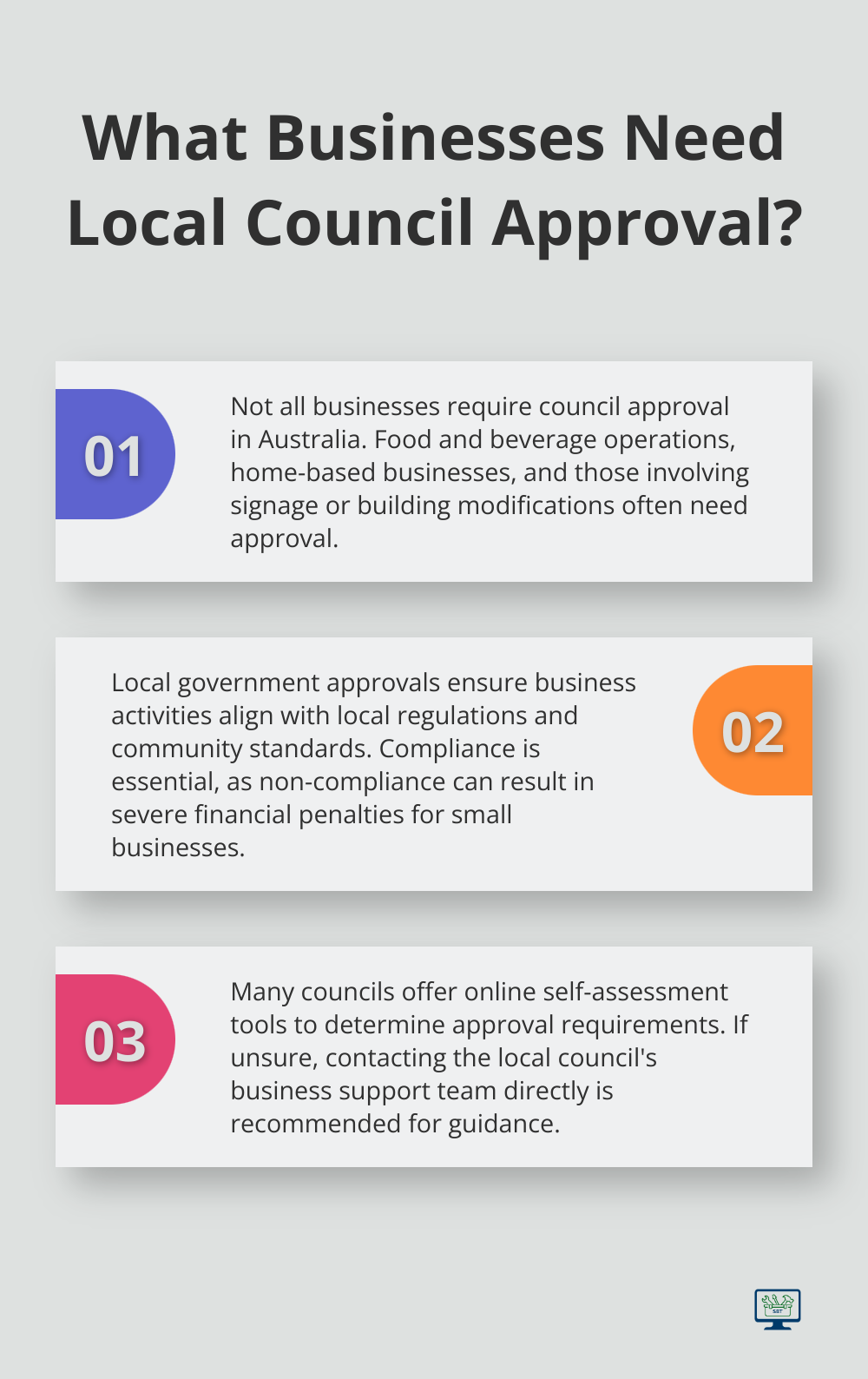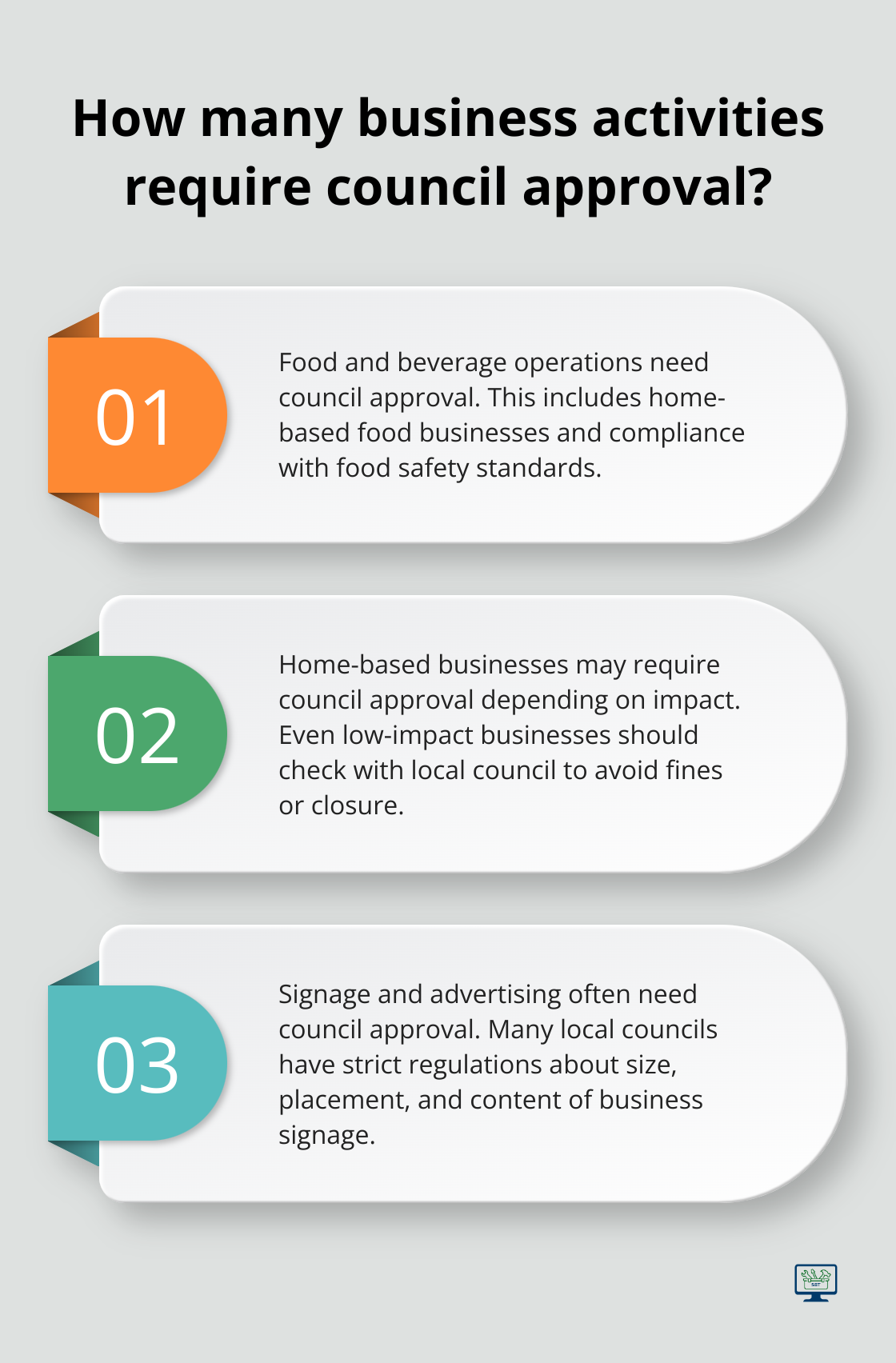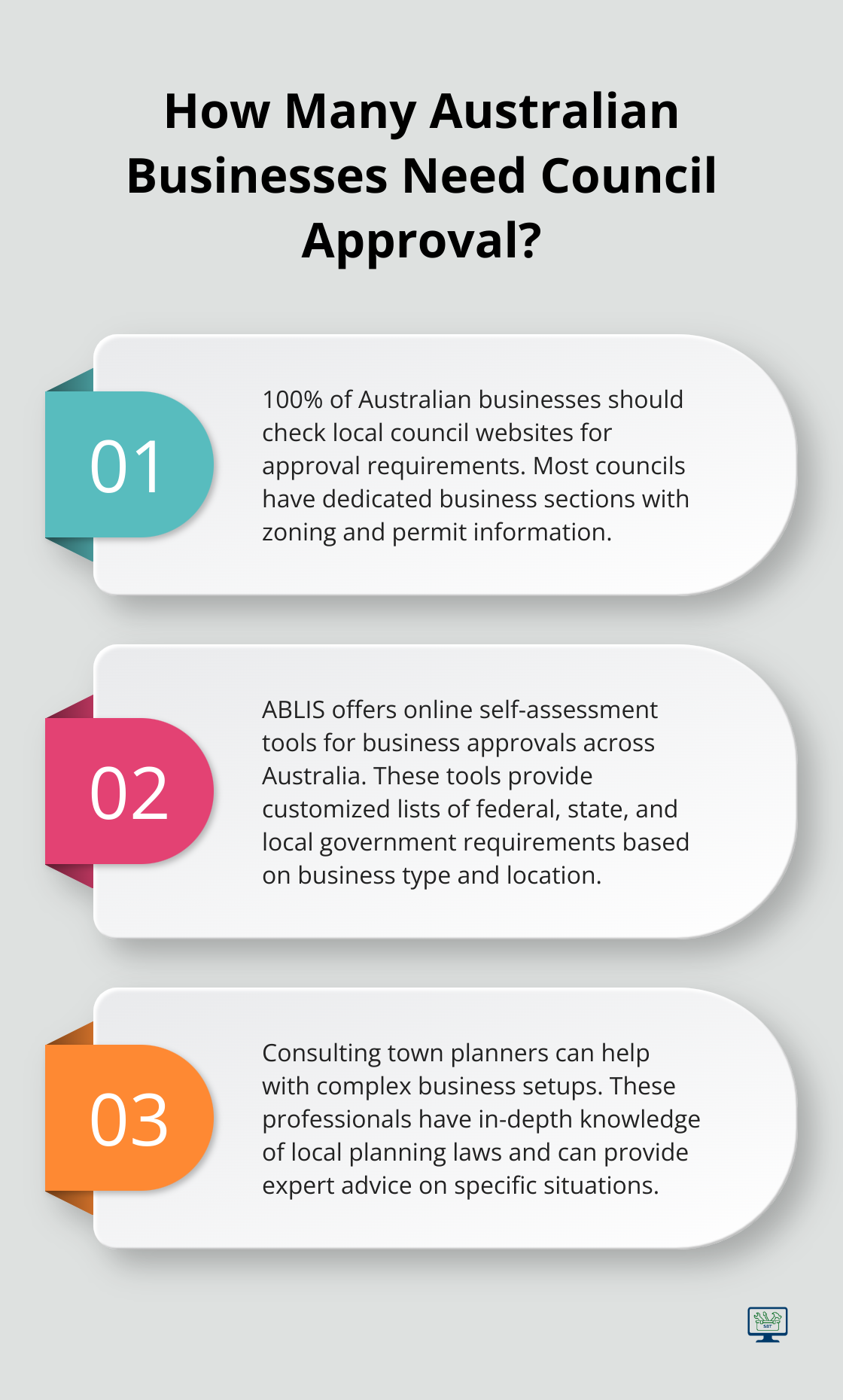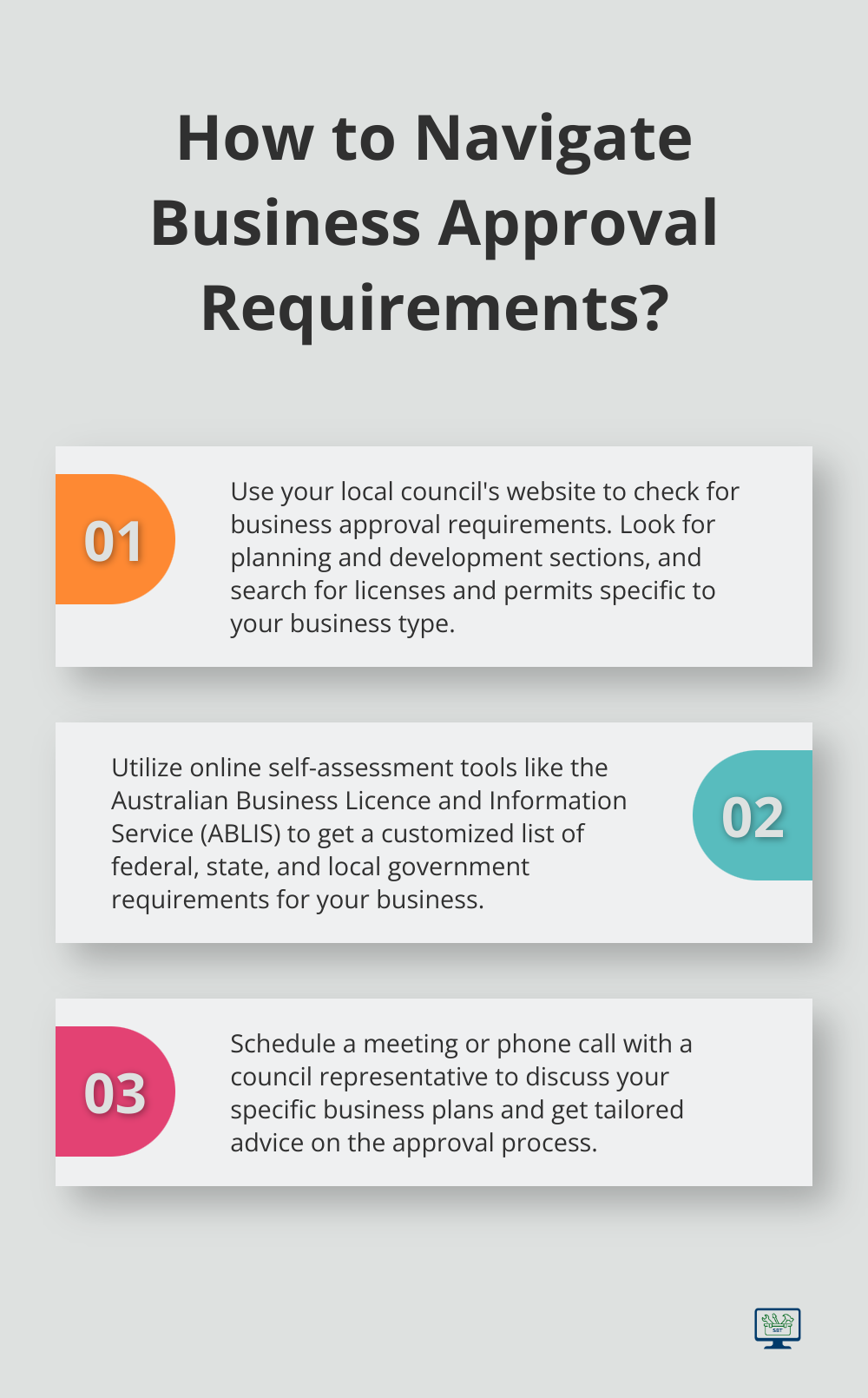Starting a business in Australia? You might need council approval for your business. Many entrepreneurs overlook this crucial step, potentially risking fines or closure.
At SmallBizToolbox, we’ve seen countless small businesses struggle with local regulations. This guide will help you navigate the complex world of council approvals and ensure your venture starts on the right foot.
What Is Local Council Approval?
Definition and Purpose
Local government approvals are a legal requirement for many businesses in Australia. This process involves your local government authority reviewing and approving your business activities to ensure they align with local regulations and community standards.
Types of Businesses Requiring Approval
Not all businesses need council approval, but many do. Food and beverage operations, home-based businesses, and those involving signage or building modifications often require approval. A café needs approval for food handling, while a home-based consultant might need permission if client visits increase local traffic.
Importance of Compliance
Compliance with local council regulations is essential for small businesses. The consequences of non-compliance can be severe. These penalties can financially devastate small businesses (especially startups and those with limited capital).
Checking for Approval Requirements
To determine if your business needs approval, start by visiting your local council’s website. Many councils offer online self-assessment tools. These tools can quickly tell you if you need approval based on your business type and location.

If you’re still unsure after using online resources, contact your local council directly. Most councils have dedicated business support teams ready to guide you through the approval process. It’s always better to ask than to assume and risk operating illegally.
Proactive compliance often leads to smoother business operations and better community relations. Taking the time to understand and comply with local regulations can save you time, money, and stress in the long run.
Now that we’ve covered the basics of local council approval, let’s explore the common business activities that typically require this approval in more detail.
Which Business Activities Need Council Approval?
Food and Beverage Operations
If you plan to open a café, restaurant, or any food-related business, you will almost certainly need council approval. This includes home-based food businesses too. You will need to comply with food safety standards, obtain proper licenses, and possibly undergo regular inspections. Before starting your business, you must notify your local council, and everyone handling food must know how to keep it safe.
Home-Based Businesses
Running a business from home doesn’t automatically exempt you from council approval. Home-based businesses may require council approval depending on the potential impact of your proposed business on the site and surrounding amenity. Even if you think your home business has a low impact, you should check with your local council to avoid potential fines or closure.
Signage and Advertising
If you want to put up a sign for your business, prepare to seek council approval first. Many local councils enforce strict regulations about the size, placement, and content of business signage (to maintain the area’s aesthetic appeal and ensure road safety). Some areas, especially those with historical significance, may have even stricter rules about signage.
Building Modifications and Renovations
Your business will need council approval if it requires any structural changes to a building. This includes both internal and external modifications. The Australian Building Codes Board sets national standards, but local councils often have additional requirements. You should check with your council first whether you’re adding a new shopfront, creating a commercial kitchen, or just changing the internal layout.
Change of Use for Commercial Properties
If you think of turning an old warehouse into a trendy co-working space or converting a residential property into a small office, you will need council approval. These scenarios involve a change of use, which almost always requires official permission. The Property Council of Australia emphasizes that zoning laws and building codes can significantly impact such conversions.

These common scenarios highlight the importance of understanding local regulations. The specific requirements can vary greatly depending on your location and the nature of your business. Many businesses face setbacks due to overlooking council approvals. To avoid such pitfalls, you should thoroughly research local regulations or seek professional advice before launching your business venture. Now, let’s explore the steps you can take to determine if your specific business needs approval.
How to Check if Your Business Needs Approval
Start with Your Local Council’s Website
Your first step should be to visit your local council’s website. Most Australian councils feature dedicated business sections that outline approval requirements. Look for planning and development sections, which often contain valuable information about zoning laws and permitted uses for different areas. Search for licences and permits specific to your business type.
Utilize Online Self-Assessment Tools
Many councils offer online self-assessment tools that can quickly determine if you need approval. The Australian Business Licence and Information Service (ABLIS) provides a customized list of federal, state, and local government requirements based on your business type and location. Enter your business details, and ABLIS will generate a report outlining necessary licences, permits, and approvals.
Engage Directly with Council Officials
If online resources don’t provide clear answers, contact your local council directly. Most councils have business support teams ready to assist. Schedule a meeting or phone call with a council representative to discuss your specific business plans. They can provide tailored advice and guide you through the approval process if necessary.
Consult with a Town Planner
For complex business setups or if you’re unsure about interpreting council regulations, consider consulting a town planner. These professionals have in-depth knowledge of local planning laws and can provide expert advice on your specific situation. While this option involves a cost, it can save you time and potential headaches in the long run.
Assess Your Business Impact
Evaluate the potential impact of your business on the local area. Consider factors such as noise levels, traffic increase, and environmental effects. Businesses with significant impacts (e.g., those operating late at night or generating high traffic) are more likely to require council approval. This self-assessment can help you anticipate potential concerns and prepare for the approval process.

Final Thoughts
Council approval for business can challenge small business owners. You must understand and comply with these regulations to ensure your venture’s success and longevity. Research local council regulations, use online resources, and seek professional advice when necessary to operate within the legal framework.

Proactive compliance demonstrates your commitment to responsible business practices. It fosters positive relationships with local authorities and residents. Your local council’s website, the Australian Business Licence and Information Service (ABLIS), and industry associations provide valuable guidance.
For comprehensive support in growing your small business, explore SmallBizToolbox. This online resource hub offers tools and insights to boost your business success. You lay a solid foundation for your business to thrive in the long term when you understand and adhere to local council requirements.
How useful was this Resource?
Click on a star to rate it!
Average rating 0 / 5. Vote count: 0
No votes so far! Be the first to rate this post.
We are sorry that this post was not useful for you!
Let us improve this Resource!
Tell us how we can improve this Resource?














